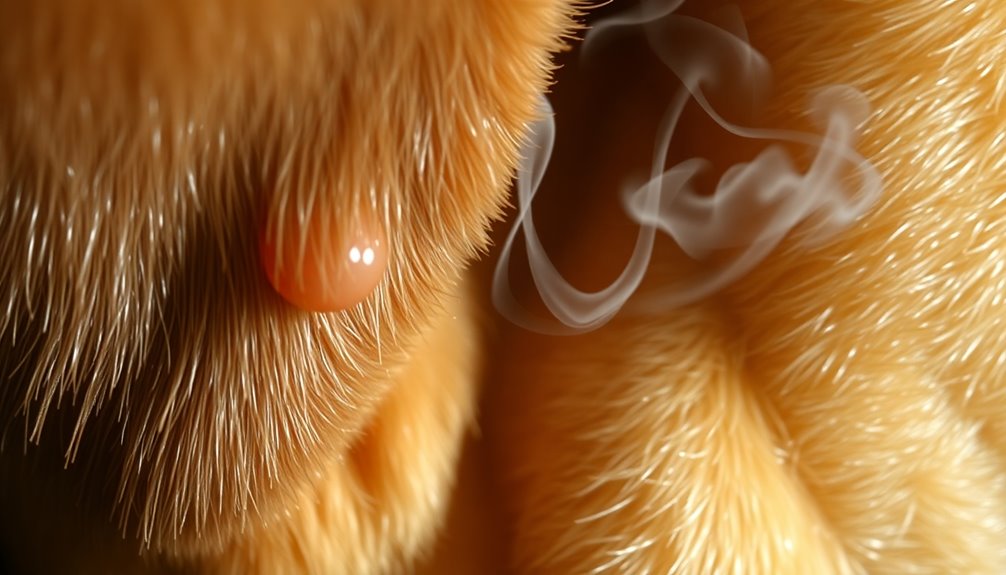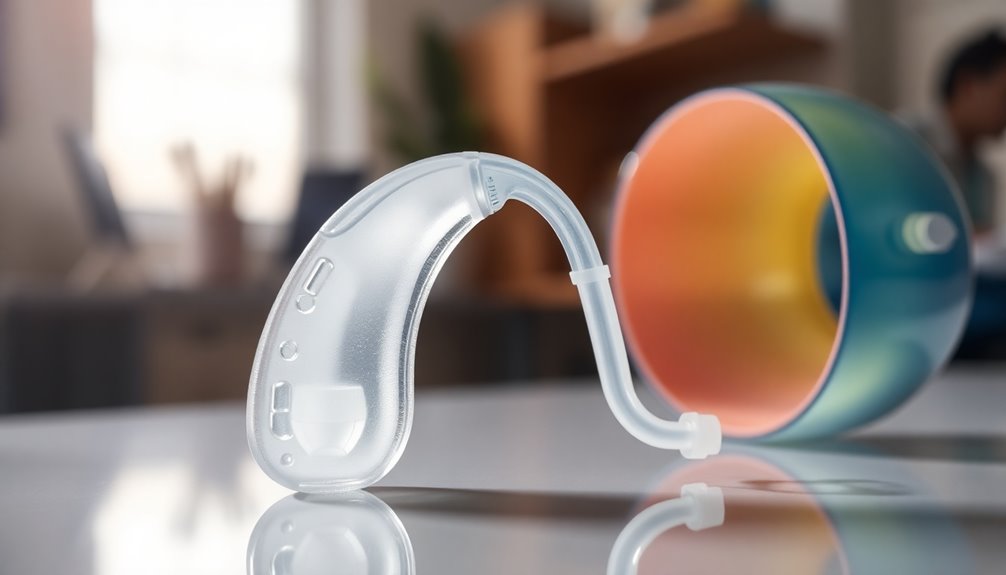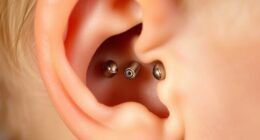If you notice a foul odor coming from your ears, don't ignore it! Smelly ears can stem from sweat, oil, and bacteria thriving in warm, moist areas. Poor hygiene practices or skin conditions like eczema can worsen the smell. If you also see irritation, redness, or discharge, it could indicate infections that need medical attention. Even changes in diet or hormones can make earwax smellier. Regular cleaning and proper care are essential to prevent these issues. Stay aware of symptoms to catch potential problems early, as there's more you should know about keeping your ears healthy and odor-free.
Key Takeaways
- Ear odor often indicates poor hygiene, skin conditions, or infections; regular cleaning is essential to prevent foul smells.
- Symptoms like redness, discharge, or persistent odor may signal serious underlying issues requiring medical attention.
- Fungal infections and excessive earwax buildup can exacerbate ear odor; consider regular check-ups to monitor ear health.
- Maintaining a dry and clean environment helps reduce moisture that contributes to ear odor and related infections.
- Early intervention is crucial; ignoring symptoms can lead to complications and worsen existing conditions.
Understanding Ear Odor

Ear odor can be both surprising and concerning, often stemming from a mix of sweat, oil, and bacteria that thrive in the warm, moist areas around your ears. This unpleasant phenomenon typically occurs behind the ears and in the ear canal, leading to foul smells that can resemble cheese or body odor.
Poor hygiene practices can exacerbate ear odor; infrequent cleaning behind your ears or neglecting ear piercings allows sweat and secretions to combine with bacteria, creating a more potent odor.
In some cases, conditions like seborrheic dermatitis or eczema can irritate your skin, disrupting its natural barrier and encouraging bacterial growth. Fungal and bacterial infections can also thrive in the ear region, resulting in unpleasant smells and potentially causing symptoms like redness, irritation, or discharge.
To combat ear odor, regular cleaning with mild soap and water is essential. You should also monitor for signs of infections, as these can worsen the situation.
Common Causes of Smelly Ears

A variety of factors can lead to smelly ears, often starting with the build-up of earwax, sweat, and oil. When these substances accumulate, they can mix with bacteria, creating an unpleasant smell.
Poor hygiene practices play a significant role here; if you don't clean your ears and the surrounding areas regularly, odors are likely to develop.
Infections can also contribute to ear odor. Fungal infections, such as candidiasis, thrive in the warm, moist environment of your ears, leading to foul smells. Similarly, bacterial infections can exacerbate the problem.
Skin conditions like seborrheic dermatitis or eczema may cause irritation, which can further result in odor production behind your ears.
Additionally, certain foods or hormonal changes might alter the composition of your earwax, making it more pungent.
It's essential to pay attention to your ear health. When you notice an unusual smell, it could indicate underlying issues that need addressing.
Symptoms to Watch For
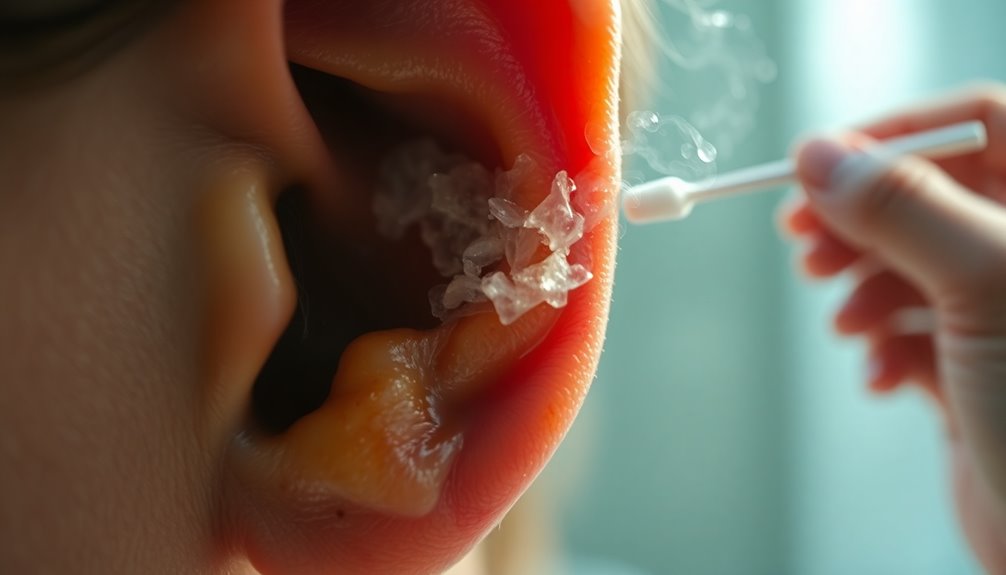
When you notice a foul smell coming from the area around your ears, it's important to pay attention to other symptoms that may accompany it. Look out for signs of irritation or redness, as these could indicate the presence of bacteria or fungal infections.
If you see flaking or peeling skin behind your ears, it might suggest skin conditions like seborrheic dermatitis, which can contribute to that unpleasant odor.
Another significant symptom to watch for is any discharge or pus, especially if you have an infected ear piercing. This situation requires immediate medical attention.
You should also be mindful of any itching or discomfort in the affected area, as these can signal an underlying infection or poor hygiene practices leading to odor accumulation.
If you've been maintaining good hygiene but still experience a persistent odor, it could point to a more serious underlying issue, such as an ear infection or another skin condition.
In such cases, consulting a healthcare professional is important. By recognizing these symptoms early, you can take the necessary steps to address the problem effectively.
Diagnosing the Problem
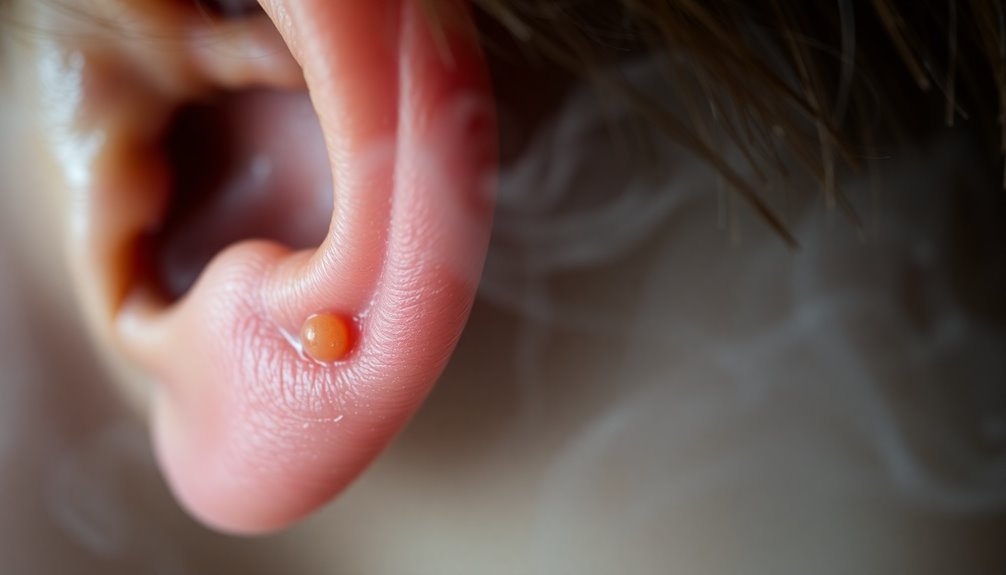
When you notice smelly ears, getting a physical examination is essential to pinpoint the cause.
Your healthcare provider might also order laboratory tests to check for any bacterial or fungal infections.
This thorough approach helps identify any underlying issues and guarantees you get the right treatment.
Physical Examination Techniques
To diagnose smelly ears effectively, healthcare professionals kick off the examination with an otoscopic inspection, looking for wax buildup, redness, or signs of infection in the ear canal.
During this physical examination, they also assess the skin behind the ears for irritation, discharge, and possible fungal or bacterial infections.
Here's what you can expect during the examination:
- Otoscopy: The doctor uses an otoscope to inspect the ear canal for any abnormalities.
- Skin Evaluation: They'll check for irritation or discharge behind the ears, which can indicate hygiene issues or infections.
- Earwax Assessment: Foul-smelling earwax can lead to further testing to identify specific bacteria or fungi causing the odor.
- Medical History Review: They'll discuss your hygiene practices and any underlying health conditions that might contribute to the problem.
If you report hearing difficulties alongside the smell behind the ears, audiological assessments might be conducted to determine if there's a blockage or infection.
Addressing these issues early can help prevent further complications and guarantee better ear health.
Laboratory Testing Procedures
Laboratory testing procedures play an essential role in diagnosing the underlying causes of smelly ears. By identifying bacterial or fungal infections through cultures, these tests help pinpoint the exact cause of the odor. Alongside laboratory testing, a thorough physical examination assesses any infection, inflammation, or skin condition that may be contributing to the smell.
| Type of Test | Purpose | Outcome |
|---|---|---|
| Laboratory Testing | Identify bacterial infections or fungi | Determine the specific cause of odor |
| Blood Tests | Check for systemic issues affecting ear health | Uncover underlying health problems |
| Imaging Studies | Investigate structural abnormalities | Reveal deeper infections or issues |
In persistent cases, imaging studies like X-rays or CT scans may be utilized. Regular follow-up consultations and repeat laboratory tests are vital for treatment monitoring and preventing recurrent issues. By staying proactive with these procedures, you're better equipped to maintain your ear health and address any concerning odors effectively.
Effective Treatment Options
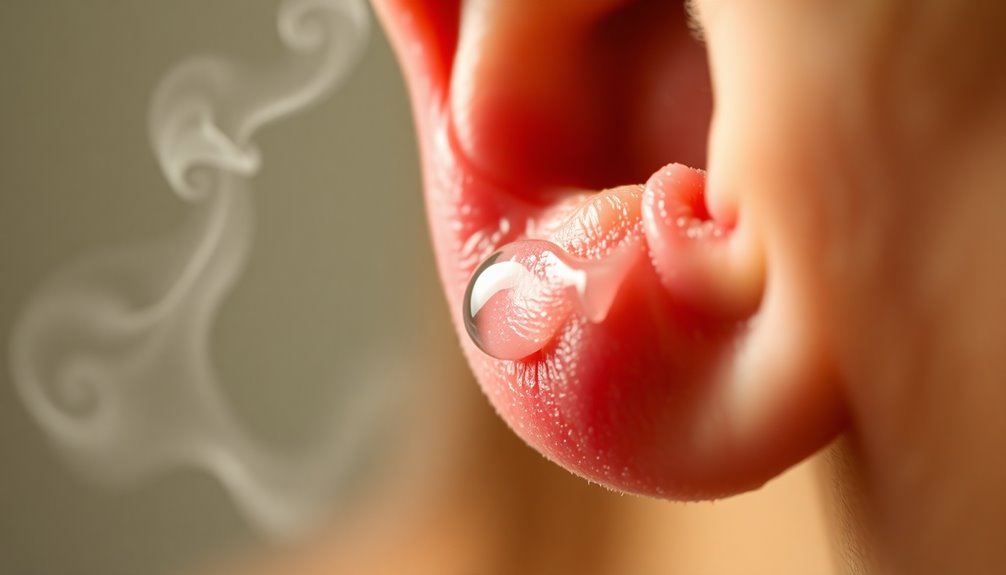
If you've noticed an unpleasant smell coming from your ears, addressing the issue promptly is essential. The odor could stem from infections or poor hygiene, so you should consider several effective treatment options:
- Regular Cleaning: Gently clean the affected area behind your ears with mild soap and warm water. This simple step promotes hygiene and greatly reduces odor.
- Topical Treatments: Consult a healthcare provider about antifungal or antibacterial creams. These may be prescribed to tackle any underlying infections contributing to the smell.
- Oral Medications: In cases of severe infections, you might need oral medications. These can effectively eliminate the infection and its associated odor.
- Lifestyle Changes: Maintain proper hygiene and opt for breathable fabrics.
These lifestyle changes can help prevent the buildup of sweat and oil, which often leads to unpleasant smells.
Prevention Tips
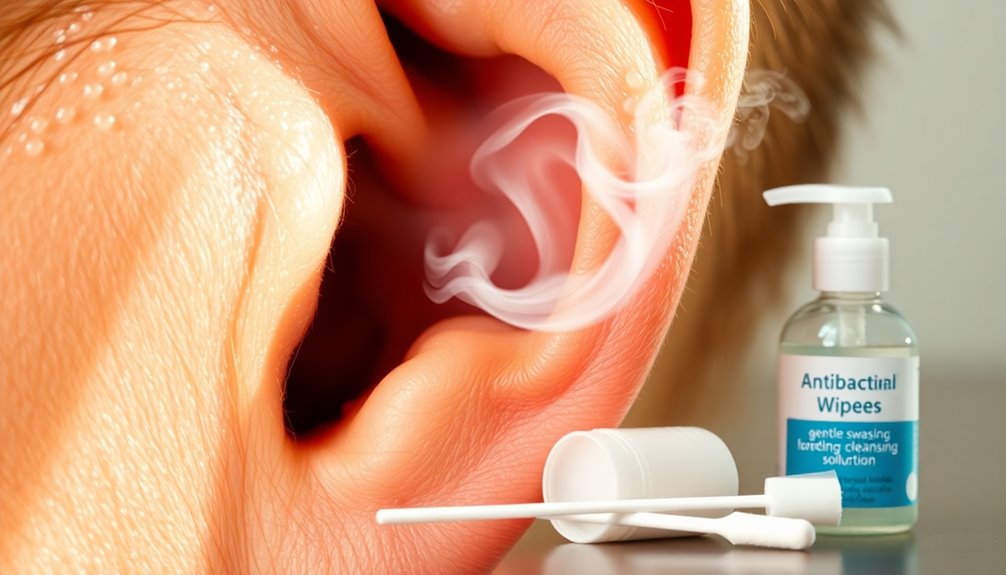
To prevent smelly ears, you should maintain daily hygiene by washing behind your ears with mild soap and water.
It's also wise to avoid foods that can contribute to body odor, as these can affect your overall scent.
Keeping these habits in check can help you stay fresh and odor-free.
Maintain Daily Hygiene
Every day, maintaining proper hygiene behind your ears is essential for preventing unpleasant odors. This area can easily trap sweat, oil, and bacteria, leading to issues if neglected.
Here are some tips to keep your ears clean and odor-free:
- Wash Daily: Use mild soap and warm water to wash behind your ears thoroughly. This helps remove sweat and bacteria that can cause odors.
- Dry After Activities: After physical activities, make sure to dry the area completely. Use a towel or wipes to eliminate any moisture that can lead to bacterial growth.
- Clean Ear Piercings: If you have ear piercings, regularly clean them with antiseptic solutions. Rotate your jewelry often to avoid infections that may produce odor.
- Choose Breathable Fabrics: Opt for breathable clothing materials to minimize sweat accumulation around your ears. This can greatly reduce conditions that cause odor.
- Consider Humidity Levels: High humidity can exacerbate odor issues, so using an air purifier can help maintain a comfortable environment by reducing moisture and allergens.
Avoid Odor-Inducing Foods
Maintaining daily hygiene behind your ears is just one part of the equation when it comes to preventing unpleasant odors. You also need to be mindful of what you eat. Certain odor-inducing foods, like garlic and onions, contain sulfur that can break down during digestion, leading to body odors that may escape through your skin and even your ears.
Spicy foods can ramp up sweat production, creating a recipe for odor when mixed with bacteria. Processed foods and those high in sugar can wreak havoc on your gut health, potentially causing systemic odors that manifest as smelly ears.
Additionally, consuming fatty, fried items can alter the composition of your skin oils and earwax, resulting in increased odor production. To keep odors at bay, focus on hydration. Drinking plenty of water helps dilute any potential odor-causing compounds in your body.
When to Seek Medical Help

A persistent foul odor from your ears can be a concerning sign that shouldn't be ignored. It may indicate an underlying infection or condition that requires you to seek medical help.
Here are some situations when you should consult a healthcare professional:
- If you notice a foul odor despite maintaining proper hygiene, it could signal an underlying infection.
- Watch for additional symptoms such as discharge, swelling, redness, or severe itching in the ear area alongside the odor.
- Contact a doctor if the foul odor is accompanied by ear pain, changes in hearing, or a feeling of fullness in your ear.
- If you have a history of ear infections or skin conditions affecting your ears and detect a new or worsening odor, it's wise to seek a medical evaluation.
Don't overlook the signs, especially in children who may tug at their ears or become more fussy.
Remember, early intervention can prevent complications and guarantee proper treatment for any ear-related issues.
Prioritize your ear health—listen to your body!
Frequently Asked Questions
What Does It Mean When Your Ear Stinks?
When your ear stinks, it often signals an underlying issue. You might've an ear infection, like otitis externa, causing discharge and inflammation.
Accumulated earwax, bacteria, or debris can also create unpleasant odors, especially if there's poor hygiene or moisture.
Skin conditions, hormonal changes, or certain medications may further affect earwax composition.
If you notice persistent odor alongside pain, itching, or hearing loss, it's essential to consult a healthcare professional for evaluation and treatment.
Can You Smell Bad Without Knowing?
You're like a ship sailing through familiar waters, unaware of the stench wafting from your hull.
Yes, you can smell bad without knowing it. Your brain can tune out odors you're used to, leaving you oblivious to unpleasant scents.
Plus, if you've got an impaired sense of smell, detecting these issues becomes even trickier.
Regular self-checks and asking trusted friends can help you stay afloat and keep your ship smelling fresh.
Is Smelling Bad a Red Flag?
Yes, smelling bad can definitely be a red flag. It often signals underlying health issues, such as infections or poor hygiene.
If you notice a persistent odor, it's important to pay attention to it. Consider your hygiene practices and any other symptoms you might have.
If the smell doesn't go away or is accompanied by discomfort or irritation, you should consult a healthcare professional to address potential concerns.
What Does It Mean When You Smell a Scent That Isn't There?
When you smell a scent that isn't there, it's called phantosmia. This can happen due to various factors like nasal infections, allergies, or even neurological disorders.
You might notice unpleasant odors that seem real but have no external source. It's important to pay attention to this phenomenon, as it could signal underlying health issues.
If it persists, consider consulting a healthcare professional to determine the cause and explore possible treatments.
Conclusion
To sum up, don't let smelly ears be the canary in the coal mine for a bigger issue. By understanding the causes and symptoms, you can tackle ear odor head-on. Remember, prevention is key, and knowing when to seek medical help can save you from unnecessary discomfort. Keep your ears fresh and healthy—after all, a little care today can prevent a stinky situation tomorrow!
